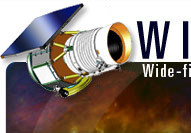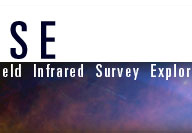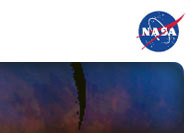|
 |

 |

| An artistís conception of the WISE satellite in orbit around Earth. |
|
WISE is a NASA-funded Explorer mission that will provide
a vast storehouse of knowledge about the solar system, the Milky
Way, and the Universe. Among the objects WISE will study are asteroids,
the coolest and dimmest stars, and the most luminous galaxies.
WISE is an unmanned satellite carrying an infrared-sensitive telescope
that will image the entire sky. Since objects around room temperature
emit infrared radiation, the WISE telescope and detectors are kept
very cold (below -430° F /15 Kelvins, which is only 15° Centigrade
above absolute zero) by a cryostat -- like an ice chest but filled
with solid hydrogen instead of ice.
Solar panels will provide WISE with the electricity it needs to
operate, and will always point toward the Sun. Orbiting several
hundred miles above the dividing line between night and day on
Earth, the telescope will look out at right angles to the Sun and
will always point away from Earth. As WISE orbits from the North
pole to the equator to the South pole and then back up to the North
pole, the telescope will sweep out a circle in the sky. As the
Earth moves around the Sun, this circle will move around the sky,
and after six months WISE will have observed the whole sky.
As WISE sweeps along the circle a small mirror scans in the opposite
direction, capturing an image of the sky onto an infrared sensitive
digital camera which will take a picture every 11 seconds. Each
picture will cover an area of the sky 3 times larger than the full
Moon. After 6 months WISE will have taken nearly 1,500,000 pictures
covering the entire sky. Each picture will have one megapixel at
each of four different wavelengths that range from 5 to 35 times
longer than the longest waves the human eye can see. Data taken
by WISE will be downloaded by radio transmission 4 times per day
to computers on the ground which will combine the many images taken
by WISE into an atlas covering the entire celestial sphere and
a list of all the detected objects.
Read the WISE mission Fact Sheet  PDF (1.7 MB). PDF (1.7 MB).
Read the WISE Launch Press Kit  PDF (2.0 MB). PDF (2.0 MB).
WISE in a box: Create your own 3-D model of the WISE spacecraft.
|
 |




